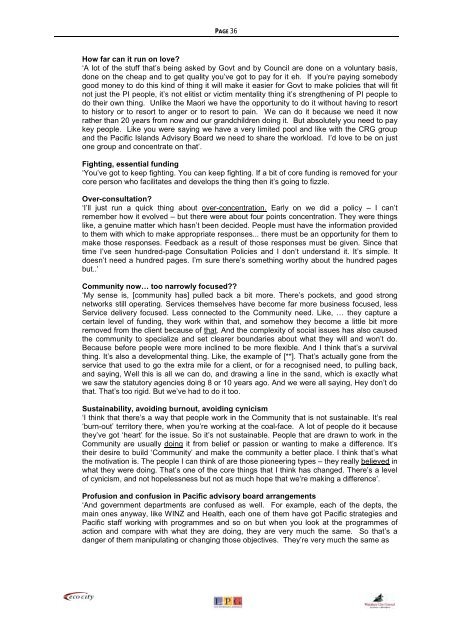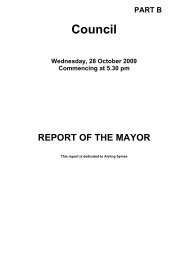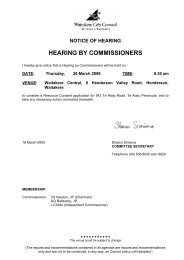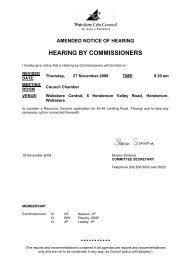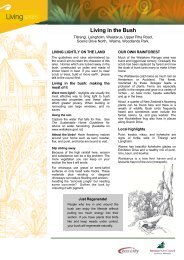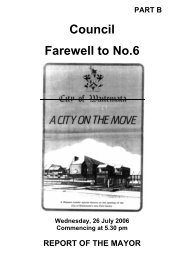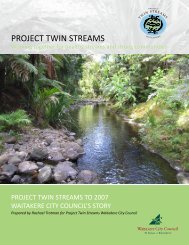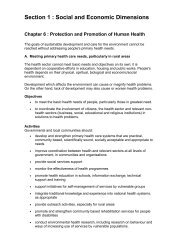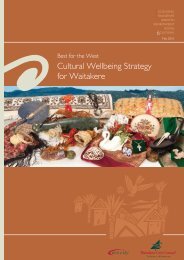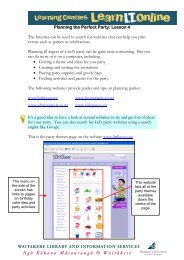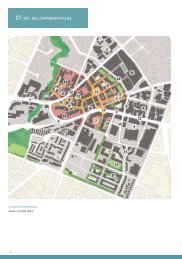The Waitakere Way - Looking Back, Going Forward - Auckland Council
The Waitakere Way - Looking Back, Going Forward - Auckland Council
The Waitakere Way - Looking Back, Going Forward - Auckland Council
Create successful ePaper yourself
Turn your PDF publications into a flip-book with our unique Google optimized e-Paper software.
PAGE 36How far can it run on love?‘A lot of the stuff that’s being asked by Govt and by <strong>Council</strong> are done on a voluntary basis,done on the cheap and to get quality you’ve got to pay for it eh. If you’re paying somebodygood money to do this kind of thing it will make it easier for Govt to make policies that will fitnot just the PI people, it’s not elitist or victim mentality thing it’s strengthening of PI people todo their own thing. Unlike the Maori we have the opportunity to do it without having to resortto history or to resort to anger or to resort to pain. We can do it because we need it nowrather than 20 years from now and our grandchildren doing it. But absolutely you need to paykey people. Like you were saying we have a very limited pool and like with the CRG groupand the Pacific Islands Advisory Board we need to share the workload. I’d love to be on justone group and concentrate on that’.Fighting, essential funding‘You’ve got to keep fighting. You can keep fighting. If a bit of core funding is removed for yourcore person who facilitates and develops the thing then it’s going to fizzle.Over-consultation?‘I’ll just run a quick thing about over-concentration. Early on we did a policy – I can’tremember how it evolved – but there were about four points concentration. <strong>The</strong>y were thingslike, a genuine matter which hasn’t been decided. People must have the information providedto them with which to make appropriate responses... there must be an opportunity for them tomake those responses. Feedback as a result of those responses must be given. Since thattime I’ve seen hundred-page Consultation Policies and I don’t understand it. It’s simple. Itdoesn’t need a hundred pages. I’m sure there’s something worthy about the hundred pagesbut..’Community now… too narrowly focused??‘My sense is, [community has] pulled back a bit more. <strong>The</strong>re’s pockets, and good strongnetworks still operating. Services themselves have become far more business focused, lessService delivery focused. Less connected to the Community need. Like, … they capture acertain level of funding, they work within that, and somehow they become a little bit moreremoved from the client because of that. And the complexity of social issues has also causedthe community to specialize and set clearer boundaries about what they will and won’t do.Because before people were more inclined to be more flexible. And I think that’s a survivalthing. It’s also a developmental thing. Like, the example of [**]. That’s actually gone from theservice that used to go the extra mile for a client, or for a recognised need, to pulling back,and saying, Well this is all we can do, and drawing a line in the sand, which is exactly whatwe saw the statutory agencies doing 8 or 10 years ago. And we were all saying, Hey don’t dothat. That’s too rigid. But we’ve had to do it too.Sustainability, avoiding burnout, avoiding cynicism‘I think that there’s a way that people work in the Community that is not sustainable. It’s real‘burn-out’ territory there, when you’re working at the coal-face. A lot of people do it becausethey’ve got ‘heart’ for the issue. So it’s not sustainable. People that are drawn to work in theCommunity are usually doing it from belief or passion or wanting to make a difference. It’stheir desire to build ‘Community’ and make the community a better place. I think that’s whatthe motivation is. <strong>The</strong> people I can think of are those pioneering types – they really believed inwhat they were doing. That’s one of the core things that I think has changed. <strong>The</strong>re’s a levelof cynicism, and not hopelessness but not as much hope that we’re making a difference’.Profusion and confusion in Pacific advisory board arrangements‘And government departments are confused as well. For example, each of the depts, themain ones anyway, like WINZ and Health, each one of them have got Pacific strategies andPacific staff working with programmes and so on but when you look at the programmes ofaction and compare with what they are doing, they are very much the same. So that’s adanger of them manipulating or changing those objectives. <strong>The</strong>y’re very much the same as


